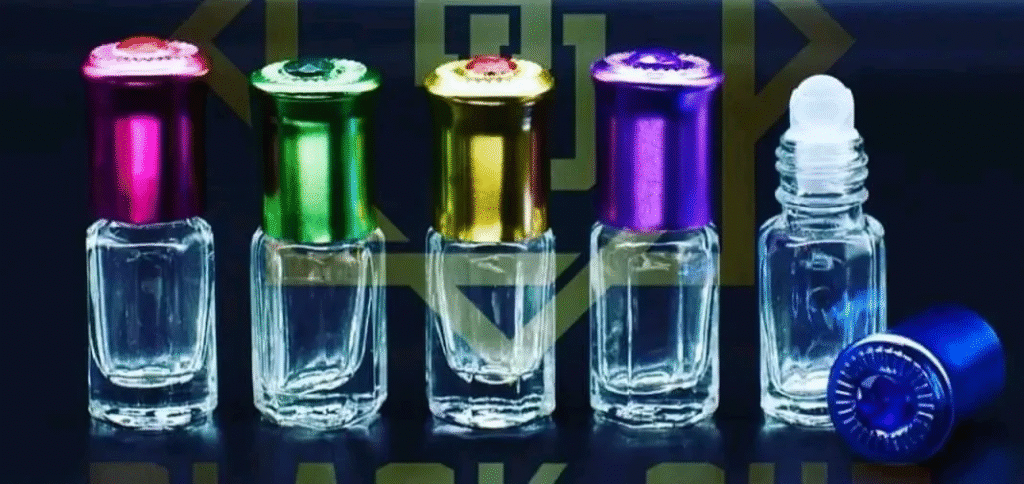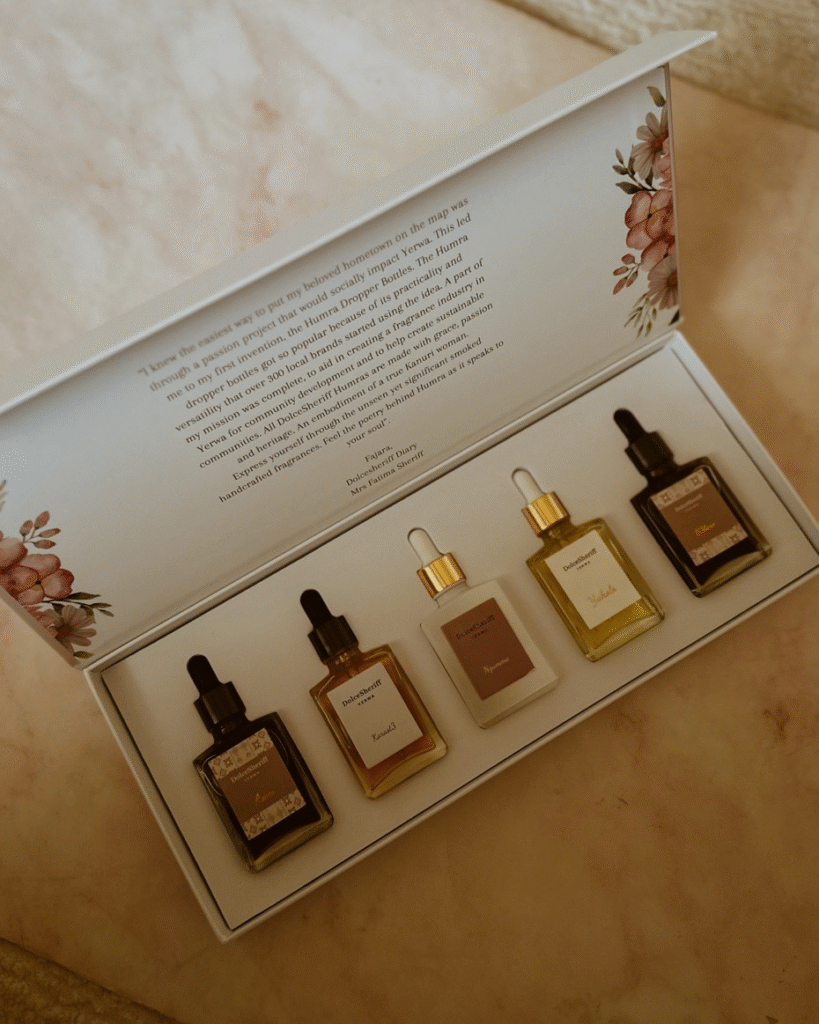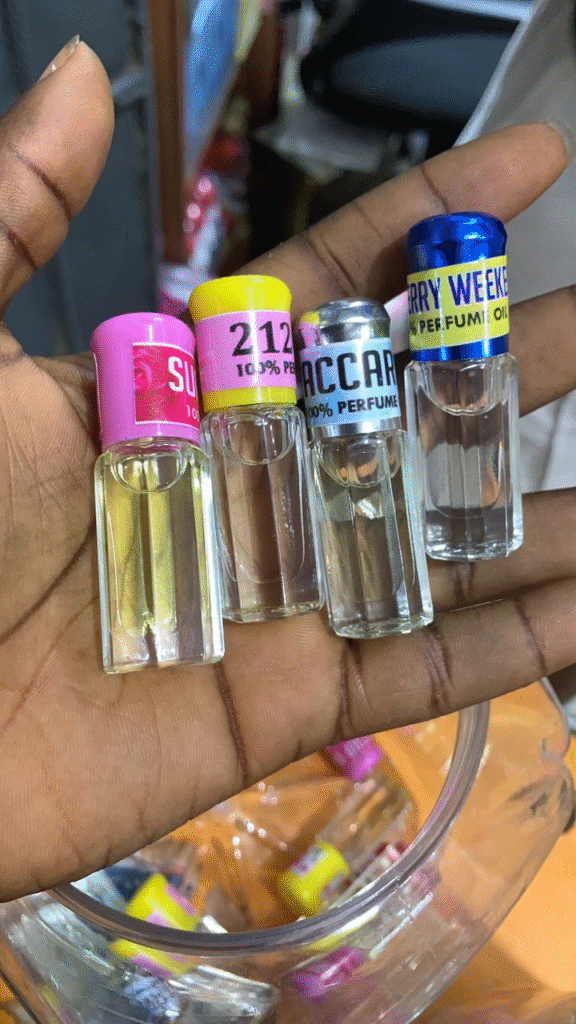It began as a cherished tradition in Northern Nigeria. But has since blossomed into a thriving nationwide industry that has created countless opportunities for entrepreneurs and small business owners. At the heart of this relatively new aromatic empire lies an often-overlooked component: the empty perfume bottle business.

It Began In Northern Nigerian
Northern Nigeria was the custodian of perfume oil traditions that rival the most sophisticated fragrance houses in Paris or Dubai. In states like Kano, Kaduna and Sokoto, families have passed down the art of blending musk, oudh, sandalwood and native flowers into intoxicating perfume oils.
The traditional process of producing oil perfumes involves the careful selection of botanicals, from the precious agarwood that gives oudh its distinctive woody complexity to locally harvested flowers that add delicate floral notes. Master perfumers, often women who learned the craft from their mothers and grandmothers, would blend these ingredients with carrier oils to create unique fragrances that could last for days on clothing and skin.
What made these Northern Nigerian perfumes particularly special was their method of application and storage. Unlike Western spray perfumes, these oils were housed in small, ornate bottles that were often made from glass or crystal. They were also sometimes adorned with intricate metalwork or decorative elements. The bottles themselves became part of the luxury experience. The treasured containers were refilled repeatedly and passed down through generations.
Going Global
Over the past decade, what was once a regional specialty has exploded across Nigeria. Social media played a pivotal role in this transformation. Instagram posts showcasing the elaborate Kabbasa ritual, where clothes are infused with perfume incense smoke went viral and captivated audiences far beyond the North.
Suddenly, everyone wanted to experience the long-lasting, deeply personal fragrances that Northern perfume oils promised. University students began seeking out “Humra” perfumes for special occasions. Young professionals discovered that these oils offered something spray perfumes couldn’t: a scent that became part of your personal signature and lingered on your clothes and in your wake long after you’d left a room.
This cultural shift created an unprecedented demand for perfume oils outside their traditional strongholds. Entrepreneurs quickly recognized the opportunity and small businesses began sprouting up across the country. From home-based operations run by university students to sophisticated brands like Dolce Sheriff (which operates in both Abuja and Lagos), the industry began taking shape.

How Northern Nigeria’s Oil Perfumes Are Made
The journey begins with sourcing ingredients, often from specific regions known for their quality. Sandalwood might come from particular areas where the wood develops the right creamy, sweet fragrance profile. Oudh is carefully selected for its complexity and depth. Local flowers are harvested at optimal times to capture their most potent aromatic compounds.
The blending process is where artistry meets chemistry. Master perfumers work with base notes (like musk and oudh), middle notes (often floral extracts) and top notes (citrus or herbal elements) to create balanced compositions.
These oils are then aged, sometimes for weeks or months to allow the different components to marry and develop their full character. Quality control is crucial at every stage. The oils must maintain consistency across batches and the final products need to meet the expectations of increasingly sophisticated consumers.
The Supply Chain of Empty Bottles
This is where the empty bottle business enters the picture. The supply chain involves multiple layers of suppliers, distributors and retailers, each playing a crucial role in getting products to market.
Primary Suppliers: These are often importers who bring in bottles from manufacturing hubs, particularly from countries like China, India and Turkey, where decorative glass bottles are produced at scale. These suppliers typically work with minimum orders of hundreds or thousands of units and serve as the wholesale foundation of the industry.
Secondary Distributors: Operating in major commercial centers like Lagos Kanoand Abuja, these businesses buy from primary suppliers and break down large orders into smaller, more manageable quantities. They’re the crucial link between bulk importers and small business owners who might only need 50 or 100 bottles at a time.
Specialty Suppliers: Some entrepreneurs have carved out niches by focusing on specific types of bottles, from specializing in ornate designs favored by luxury brands, to practical rollerballs preferred by everyday perfume makers. These suppliers often provide additional services like custom labelling or packaging.
Local Retailers: In markets across Nigeria, small-scale retailers sell individual bottles or small quantities to perfume makers who are just starting out or producing limited batches. These retailers are often the first point of contact for aspiring entrepreneurs.
Multiple Entry Points Into the Market
The beauty of the empty perfume bottle business lies in its accessibility and scalability. There are several ways to enter this market, depending on your capital, location, and ambitions.
The Market Stall Approach
Many successful bottle suppliers started with small stalls in local markets. This requires minimal initial investment – perhaps ₦50,000 to ₦100,000 to stock a basic inventory. The key is choosing the right location, ideally in markets known for beauty products or near areas where perfume makers congregate.
The Social Media Entrepreneur
With Instagram and WhatsApp Business, many young Nigerians have built thriving bottle supply businesses entirely online. They source bottles from wholesalers, showcase their inventory through high-quality photos, and serve customers nationwide through courier services. This model allows for geographic flexibility and lower overhead costs.
The Bulk Distributor
For those with more capital (₦500,000 to ₦2,000,000), becoming a bulk distributor can be highly profitable. This involves establishing relationships with international suppliers, managing inventory in warehouses, and serving multiple smaller retailers. The margins are typically lower per unit, but the volume makes up for it.
The Specialty Curator
Some entrepreneurs succeed by developing expertise in particular niches – perhaps vintage-style bottles for luxury brands, or eco-friendly options for environmentally conscious perfumers. This approach requires more market research but can command premium prices.

Sellers Massively Leverage Social Media
Nigerian bottle suppliers have proven remarkably adept at digital marketing. Instagram has become the primary showcase platform. There, many post aesthetically pleasing photos of their inventory, often styled with flowers, fabric, or other decorative elements to suggest luxury and quality.
WhatsApp Business has revolutionized customer service in this industry. Suppliers can manage order inquiries, send product catalogs, process payments, and coordinate deliveries all through a single platform. Facebook groups like Oil Perfume Market Nigeria and other pages serve as community hubs where perfume makers share tips, suppliers announce new inventory and customers leave reviews.
For suppliers with larger ambitions, platforms like Jumia and Konga offer access to Nigeria’s growing e-commerce market. Some have even expanded internationally and have begun listing on eBay and Etsy to serve Nigerian diaspora communities and international customers interested in authentic African perfume accessories.
The Numbers Behind the Business
The financial dynamics of the empty bottle business are compelling for several reasons. Bottles purchased in bulk from manufacturers might cost ₦50-200 each, depending on size, design complexity and quality. These same bottles can retail for ₦150-800 individually, representing healthy profit margins.
The key to success lies in understanding your market. Luxury perfume makers might pay premium prices for ornate, high-quality bottles that enhance their brand image. Budget-conscious producers might prioritize functionality and cost over aesthetics. Successful suppliers often maintain diverse inventories to serve both segments.
Seasonal fluctuations also affect the business. Demand typically spikes before major celebrations like Eid, Christmas and wedding seasons when perfume production increases. Savvy suppliers keep this in mind and plan their inventory and marketing around these cycles.

Anticipate These Challenges and Opportunities
Like any business, the empty bottle trade faces its own challenges. Competition has intensified as more people recognize the opportunity. This has put pressure on profit margins. Also, quality control can be difficult when dealing with international suppliers, and currency fluctuations affect import costs.
However, the opportunities remain substantial. The Nigerian perfume oil market continues growing, driven by cultural pride, social media influence and increasing disposable income. There’s also potential for export, as Nigerian perfume brands gain recognition internationally. Innovation presents another avenue for growth. Some suppliers are exploring sustainable packaging options, custom bottle designs and complementary products like labels, caps and packaging materials.
Ultimately, the most successful businesses in this space are those that view themselves not just as bottle sellers, but as partners in their customers’ success.
Conclusion
For those considering entering this business, the combination of cultural significance, growing market demand and digital marketing opportunities makes it attractive. Whether you intend starting small with a market stall or thinking big with e-commerce ambitions, the empty perfume bottle business offers a pathway to success that’s as enduring as the fragrances it helps create.












